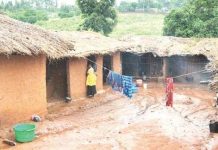Africa-Press – Malawi. Mount Mulanje — Malawi’s newly declared UNESCO World Heritage Site and a lifeline for over a million people — is under threat. A mining company wants to dig into its heart for bauxite and rare earths, but furious traditional chiefs, environmentalists, and residents are rising up, calling it a betrayal of Malawi’s soul. “This is a sacred mountain, a living being to our people. We say no to mining — a big, loud no!” thundered Traditional Authority Chikumbu, a senior chief representing 147 villages around Mulanje.
Standing majestically in southern Malawi, Mount Mulanje rises nearly 3,000 meters above sea level. It is home to more than 70 species found nowhere else on earth, including the critically endangered Mulanje cedar, Malawi’s national tree. Its slopes feed nine rivers that provide clean water to surrounding villages and to Blantyre, a city of over a million people. It is not just a mountain; it is a spiritual sanctuary, a source of food, medicine, and rain, and a living museum of culture. In July 2025, UNESCO officially listed the Mount Mulanje Cultural Landscape as a World Heritage Site, describing it as a “reflection of the spiritual and ecological harmony between people and nature.” But now, that harmony stands on the brink of destruction.
Local mining firm Akatswiri Mineral Resources, a subsidiary of Akatswiri Holdings Ltd, has set its eyes on the mountain’s Lichenya and Linje plateaus, areas of immense ecological and cultural importance. The company claims its $820 million project could generate $260 million per year and create 1,300 jobs — promises that critics say are both hollow and dangerous. Akatswiri already holds a mining license, pending environmental approval. It also had an exploration license for bauxite and rare earth elements that expired in 2024 but is reportedly seeking renewal. But the real question haunting conservationists is simple: why would Malawi allow a mining operation on its newest UNESCO site — a global symbol of natural heritage?
On August 15, senior traditional leaders held a press conference rejecting any attempts to mine Mount Mulanje. “Mount Mulanje is our identity, our protection, and our inheritance,” TA Chikumbu said firmly. “We will not allow greedy hands to dig into the heart of our mountain. Conservation, not exploitation.” Chiefs also denounced reports that some village heads had been deceived into signing documents opposing the UNESCO listing. “No one will sell our mountain in secret,” one elder warned.
Environmental experts say the consequences of bauxite mining would be catastrophic. “Strip mining will mean mass deforestation, erosion, and toxic waste,” said Matthew Groch of the international watchdog Mighty Earth. “It’s the same story everywhere bauxite is mined — rivers poisoned, forests gone, communities destroyed.” Mount Mulanje’s unique ecosystem — already struggling with illegal logging and wildfires — could collapse entirely. “Half of the plants in the proposed mining area are endemic or near-endemic,” explained Carl Bruessow, director of the Mulanje Mountain Conservation Trust (MMCT). “The mine will devastate biodiversity and contaminate the freshwater sources that sustain Blantyre and surrounding communities.”
Akatswiri chairman Hilton Banda insists the mine is a path to development. But critics call it a short-term illusion. “Mining will bring a few years of chaos and a lifetime of regret,” said TA Chikumbu. “What will remain when the mountain is gone? Dust, poison, and poverty.” Environmental educator Kondwani Chamwala, who grew up at the mountain’s base, agrees. “They come promising schools and clinics — but after they leave, the land is ruined, and the people are poorer.” Chamwala says Mount Mulanje already supports thousands of jobs through tourism and agriculture, particularly the tea industry which brings in 9% of Malawi’s foreign exchange earnings. “Tourists come here to hike, climb, and see the beauty. No one will visit a scarred mountain full of machines.”
The proposed mine could also derail millions of dollars already invested in sustainable projects. Organizations like WeForest and MMCT have spent years restoring degraded forest areas and empowering local communities to co-manage natural resources. “If mining goes ahead, everything we’ve built will be lost,” said Matthews Tsirizeni, WeForest’s country director. Roads, camps, and waste will destroy the very areas they’ve been protecting. The mine also threatens the upcoming $30 million, 6.5-megawatt hydropower plant built by MMCT to supply electricity to Mulanje’s surrounding villages — a project meant to demonstrate how conservation and development can coexist.
Despite technical and economic doubts about the project — Malawi lacks both the electricity and infrastructure needed for bauxite smelting — Akatswiri’s leadership remains defiant. “We don’t listen to critics who don’t know what they’re talking about,” Banda said in an email response. “Malawians want development, and we know what’s best for us.” But to the people of Mulanje, “development” that destroys their mountain is no development at all. “My plea is simple,” said TA Chikumbu. “Spare our mountain. Let my great-great-grandchildren see the beauty of Mulanje as we see it today.” As the debate rages, one thing is clear: the world is watching Malawi — to see whether it will protect its sacred mountain or allow greed to strip it bare.
For More News And Analysis About Malawi Follow Africa-Press






